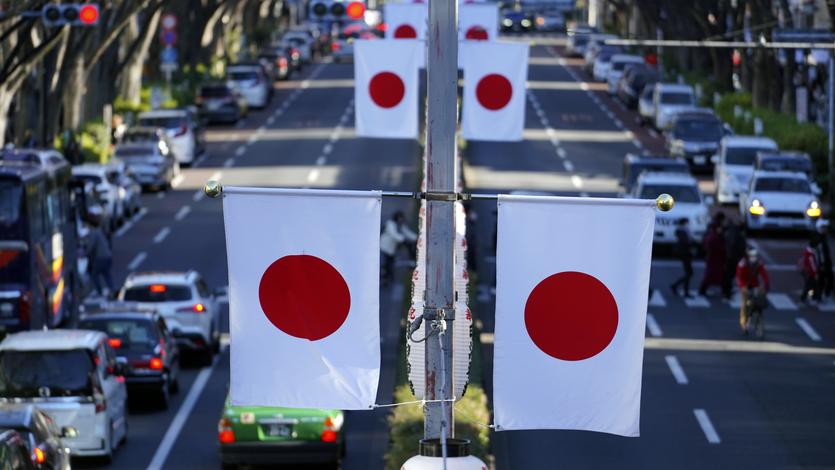 People cross a street in Shinjuku district in Tokyo on Feb 18, 2023. (PHOTO / AFP)
People cross a street in Shinjuku district in Tokyo on Feb 18, 2023. (PHOTO / AFP)
TOKYO - Japan's real wages fell the most in nearly nine years in January, official data showed, as four-decade-high inflation squeezed the purchasing power of consumers and undercut efforts by policymakers to revive a COVID-ravaged economy.
Wage trends in the world's third-largest economy are under close market scrutiny because Bank of Japan officials have said that pay hikes, combined with 2 percent inflation, are essential to it scaling back its loose monetary policy.
The central bank is set to maintain its ultra-low interest rates at a policy review on Friday, as it awaits a leadership transition that could eventually end outgoing head Haruhiko Kuroda's radical stimulus.
Inflation-adjusted real wages, a barometer of households' purchasing power, fell by 4.1 percent in January from a year earlier, the largest decrease since May 2014, labor ministry data showed on Tuesday. It followed a revised 0.6 percent drop in December.
 This file photo taken on Aug 17, 2022 shows a shopper looking at fresh produce at a supermarket in Tokyo. (PHOTO / AFP)
This file photo taken on Aug 17, 2022 shows a shopper looking at fresh produce at a supermarket in Tokyo. (PHOTO / AFP)
Total cash earnings, or nominal wages, posted a 0.8 percent year-on-year gain in January, labour ministry data showed, much weaker than a revised 4.1 percent growth in December, when strong one-off winter bonuses drove up overall salaries
"Real wages have probably hit the bottom in January as government subsidies on electricity and gas charges have taken effect in February and base effects of commodity price hikes have run their course," said Azusa Kato, senior economist at BNP Paribas Securities.
"Given that wage hikes are gathering momentum towards the annual labor negotiations this month, the Bank of Japan will come under pressure to tweak its yield curve control as early as this week. Even if it stands pat, it will stay under pressure."
ALSO READ: Japan: Economy in recovery, caution over global slowdown
The fall in real wages comes as major Japanese firms including Toyota, Nintendo and Fast Retailing pay heed to policymakers' calls and union demands by announcing plans for historic pay rises.
Japan's economy averted recession in the fourth quarter but rebounded much less than expected, delaying a recovery from the scars of the COVID-19 pandemic.
Total cash earnings, or nominal wages, posted a 0.8 percent year-on-year gain in January, the data showed, much weaker than a revised 4.1 percent growth in December, when strong one-off winter bonuses drove up overall salaries.
The feeble nominal growth in wages in January was well short of the 5.1 percent consumer inflation rate used to calculate pay in real terms. The inflation rate excludes owners' equivalent rent.
 Japanese flags are displayed along a shopping street, Jan 3, 2023, in Tokyo. (PHOTO / AP)
Japanese flags are displayed along a shopping street, Jan 3, 2023, in Tokyo. (PHOTO / AP)
Overtime pay, a gauge of business activity strength, rose 1.1 percent to 18,647 yen ($137.11) year-on-year in January, its weakest growth in 22 months, while the regular pay in the month rose 0.8 percent year-on-year to 247,153 yen
Currently, Japan's core consumer inflation, which excludes volatile fresh food prices but includes oil products, is running at 4.2 percent, the fastest pace since 1981.
Overtime pay, a gauge of business activity strength, rose 1.1 percent to 18,647 yen ($137.11) year-on-year in January, its weakest growth in 22 months, while the regular pay in the month rose 0.8 percent year-on-year to 247,153 yen.
ALSO READ: Japan's economy shrinks as inflation, slowdown take toll
Special payments fell by 1.7 percent to 11,057 yen in January, after a revised 6.5 percent growth in the previous month. The indicator tends to be volatile on months other than the bi-annual bonus seasons of November to January and June to August.
The overall number of workers in January was 51.69 million, up 1.6 percent year-on-year. The number of general employees rose 0.9 percent year-on-year to 35.22 million, while that of part-time workers was 16.47 million, up 3.0 percent compared with the same month last year.
READ MORE: Japan economy set to slow as inflation, recession risks hurt
The ministry defines "workers" as those employed for more than one month at a company that employed more than five people, or those employed on a daily basis or had less than a one-month contract but had worked more than 18 days during the two months before the survey was conducted, at a company that employs more than five people.


